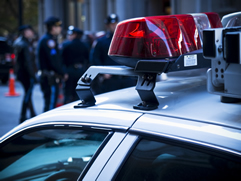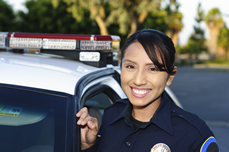
Sports Vision Training consists of the learning and training of Dynamic Visual Skills – that is “Vision in Motion”. These skills include Accommodation and Convergence, Anticipation Timing, Concentration under Stress, Depth Perception, Eye-Hand Coordination, Peripheral Awareness, Speed and Span of Recognition and Visual Reaction Time. These are all learned skills that will improve with practice.
The law enforcement officer’s career is one requiring an acute awareness and at times, perhaps unexpectedly, intense concentration. Any lack of, or deficiency in awareness, or a lapse in concentration could have grave implications as a result of an ill-times or inappropriate response.
The following is a comprehensive breakdown of the dynamic visual skills and how they more specifically relate to the functions performed by a Law Enforcement Officer.

Focusing flexibility and eye tracking are two separate skills but inseparable as they must work together to achieve good, clear vision. The task could be as mundane as watching a busy intersection while catching up on paper work, or as dangerous as a high speed pursuit, but the necessity of good focusing flexibility and eye-tracking skills is ever present.
Most efforts fail not because the physical movements were wrong, but because they were made at the wrong time. Determining the correct moment to act is certainly a prerequisite skill to efficient self defence and may spell the difference between life and death in an armed confrontation.
This skill, as it pertains to vision, is certainly the determining and underlying factor in efficiency of performance. It’s the ability to remain focused on a task, to give it your complete attention and not let yourself be distracted. Whether the task is report writing or conflict resolution, the final outcome, and the level of efficiency in arriving at it, is determined by one’s ability to remain focused on the task.
Acute depth perception is a necessary skill for efficient driving, shooting, selfdefense and even simple observation (just to name a few). Both eyes must be working in unison to insure accurate judgments of the distance, the speed and the revolution of objects in space.
Because the visual system leads the motor system, our hands or feet or body respond to the information the eyes have sent to the brain. If this information is incorrect, even to the slightest degree, there will be error in the physical response. In the performance of their duty, peace officers are constantly required to use various pieces of equipment, or execute movements in stressful situations or against resistance. He/she may be operating a vehicle, executing handcuff techniques, or utilizing a defensive baton.
The member involved in an arrest procedure, surveillance, or in a protective security function must be fully aware of everything going on around him/her while maintaining a level of concentration on a key figure.
The officer who is able to absorb large amounts of information instantaneously is better equipped and more efficient in situations that require him/her to scan and search visually. An increase in the speed in recognizing a visual stimulus has a positive effect in terms of overall performance. It drives the physical impulses to a better reflex level. The reflex action becomes more automatic and less thought out, and as a result, the officer’s intervention/response is much quicker, more accurate and more efficient.
This is a measurement of how stress and fatigue affects our ability to perform. Individuals are affected in different ways and to varying degrees. It can cause us to miss the ‘big picture’ (causing us to lose situational awareness); it can cause tunnel vision or target fixation (making us less aware of both peripheral action and verbal cues); it can create mental tunneling (making it harder for us to think outside the box and see the more obscure links); it can slow down the thought process and therefore the initiation of our responses (making it harder to ‘think on the fly’ and be consistently effective); it can cause us to over-anticipate and react too soon (making ill-timed or simply inappropriate responses).
The ability to remember and record details of objects, events and persons is the essence of field investigation. A detailed memory is not simply an asset, it is a necessity to the police function.